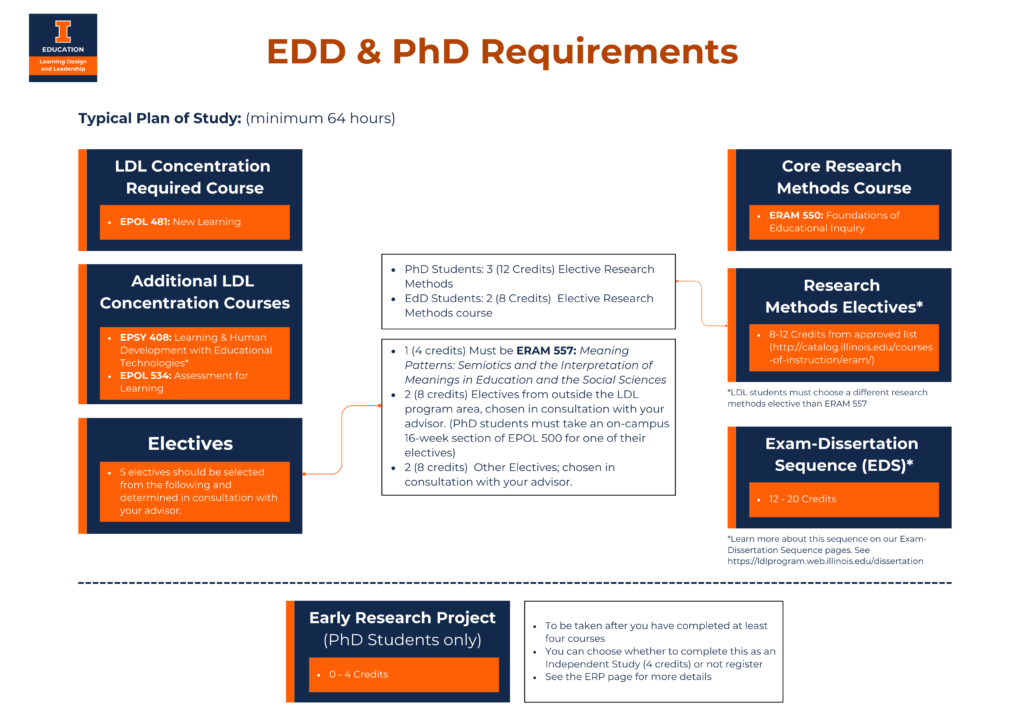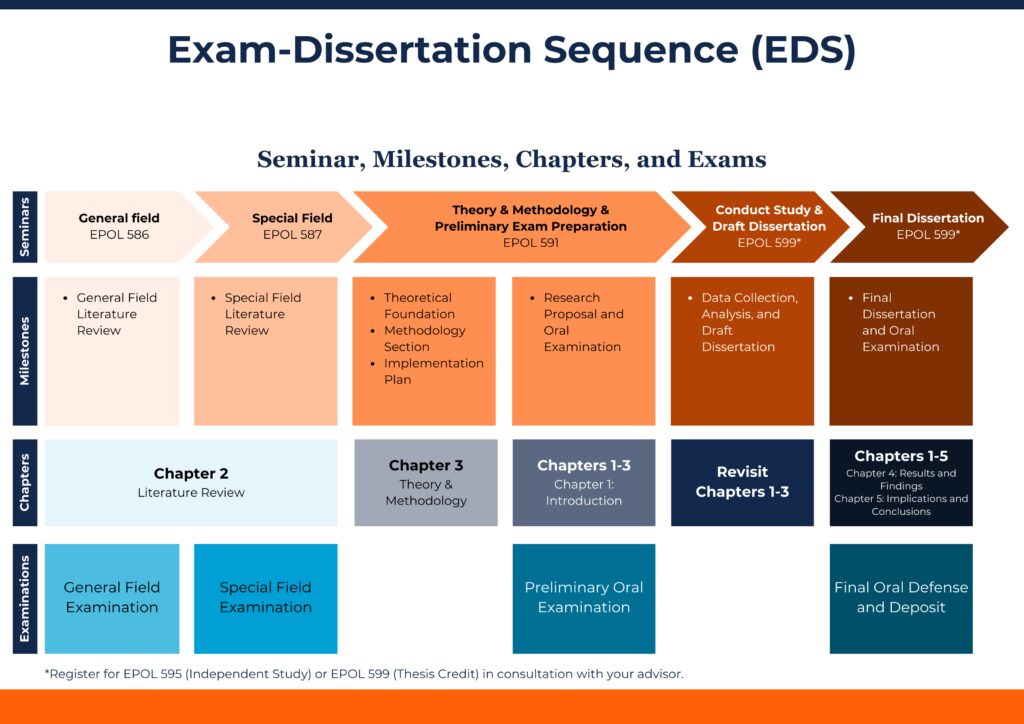The Learning Design and Leadership concentration offers both Doctor of Education (EdD) and Doctor of Philosophy (PhD) degrees. All requirements and processes are the same with the exceptions noted below. While most classes and requirements can be completed fully online, the EdD is the only degree offered for online students. PhD students must be classified as on-campus students, pay the on-campus tuition rate and fees, and comply with all on-campus student policies and procedures. PhD students must also complete a portion of their coursework on-campus.
See also the CoE Handbook for EdD and for PhD


EdD and PhD Program Planning Templates
- Program Plan (filled out online to submit for review by your advisor)
Searching for Courses
- University of Illinois Course Explorer – search for all courses offered during a given term (updated a couple of months prior to each semester)
View a text-based version of the requirements
Requirements Breakdown (64 Credits)
4 Essential LDL Courses (both EdD and PhD) (16 Credits)
- EPOL 481/EPS 431: New Learning
- EPSY 408: Learning & Human Development with Educational Technologies*
- EPOL 534/EPS 535: Assessment for Learning
- ERAM 557*: Meaning Patterns (students who started prior to 2021 may count 583 (elearning ecologies) as their fourth core course instead of ERAM 557) (ERAM 557 used to be EPOL 590 (specific meaning patterns section) and also EPOL 513)
PhD Only! Early Research Project (0 to 4 Credits)
To be taken after you have completed at least four courses
You can choose whether to complete this as an Independent Study (1-4 credits) or not register
See the ERP page for more details
1 Core Research Methods Course (both EdD and PhD) (4 Credits)
ERAM 550: Foundations of Educational Inquiry (formerly EPOL 550)
2 (EdD) or 3 (PhD) Research Method Electives (8 or 12 Credits, respectively)
PhD Students Only! 3 Elective Research Methods
EdD Students Only! 2 Elective Research Methods course
Refer to the College of Education’s Research Methods page for a list of approved courses
While ERAM 557 is a methods course, LDL students must choose a different research methods elective
If you joined the program prior to Fall 2023, your methods chapter and exam count towards one of the two research electives (formerly known as EPOL 588, which is taken as a part of the Exam-Dissertation Sequence (step 3 in the sequence)) Do not try to register for any of the exam courses until you have completed all of your regular courses.
2 Non-LDL Electives (8 Credits)
See below for a description of what an LDL vs. Non-LDL elective refers to. PhD students must take a specific on-campus 16-week section of EPOL 500 for one of their electives.
LDL and Non-LDL Electives
LDL Elective: Any course taught by Dr. Mary Kalantzis, Dr. Bill Cope, Dr. Vania Castro, or Dr. Kara Francis. See our Course Descriptions page for a list.
Non-LDL Elective: Any course offered online by other programs in the College of Education or other colleges not taught by Dr. Mary Kalantzis, Dr. Bill Cope. Note that Dr. Castro may teach a non-LDL course.
See Course Explorer for a list of all course options available in an upcoming term.
2 Other Electives (8 Credits)
These may be in or outside of LDL, but we recommend non-LDL electives
Exam-Dissertation Sequence Courses (12 to 20 Credits)
The EDS is for both EdD and PhD students. Students should expect the EDS to take at least 3 full years (see our timeline visual). Learn more about this sequence on our Examination-Dissertation Sequence pages within this website.
You may officially begin the EDS once all regular coursework has been completed, but note the tip below to look ahead at least one semester before planning to begin the sequence. Each of these courses requires a form to be approved before you can register.
EPOL 595 and EPOL 599 are considered “variable credit” courses, meaning you can distribute these in a few different ways after discussion with the dissertation advisor. Learn more about our registration policies relative to the EDS on our website.
| Course | Credits | Milestone |
|---|---|---|
| EPOL 586: General Field Research Seminar | 4 | *General Field Literature Review *Prepare for your Qualifying Exam |
| EPOL 587: Special Field Research Seminar | 4 | *General Field Literature Review *Prepare for your Qualifying Exam |
| EPOL 591: Preliminary Exam Seminar | 4 | *Chapter 3 (Methodology) *Chapter 1 (Research Proposal Introduction) |
| EPOL 595: (Independent Study) or EPOL 599: Thesis Credit | 1 | *Take your Preliminary Oral Exam |
| EPOL 599: Thesis Credit | 1-7 | These should take you multiple semesters *Conduct your study *Analyze your data *Draft your dissertation *Engage in the revision process *Prepare for your final defense |
| EPOL 599: Thesis Credit | 1 or more | Complete your final defense and deposit your dissertation |
Other Information
Getting Started with the LDL Doctoral Program
Fill out the program planning template, attend an upcoming new student onboarding session, and create your CGScholar account so that you can join our peer community on CGScholar (CGScholar is the platform used to deliver our courses).
Former LDL or other UIUC College of Education Masters or Certificate Students
Courses completed for a previous degree can not be counted or re-taken as a part of the Doctoral degree. You must choose different courses.
If you earned your Masters in the LDL concentration and/or have already taken one or more of the four essential courses, please contact the LDL concentration advisor to discuss an alternate program plan to meet the four essential LDL courses.
Differences Between the EdD and PhD
The EdD and PhD programs both consist of a total of 64 credits, accomplished through a combination of coursework and the Exam-Dissertation Sequence. The PhD has a few variances, as outlined below.
- The PhD requires EPOL 500, an on-campus 16-week course for PhD students (counts as a non-LDL elective)
- The PhD requires an Early Research Project, to be completed after you have completed approximately four courses; this can be taken for credit or no credit (does not count towards any course requirements, can be used towards the 64 credits)
- The EdD requires 2 research method electives (in addition to ERAM 550)
- The PhD requires 3 research method electives (in addition to ERAM 550)
Getting Started with the Exam-Dissertation Sequence (EDS)
Check out the EDS Getting Started, EDS Process Resources, and EDS Pre-Work page at least a semester before you plan to begin the exam-dissertation sequence.